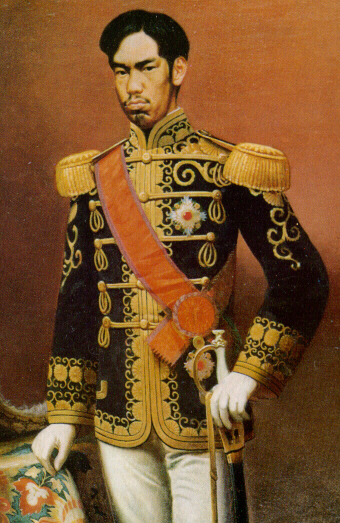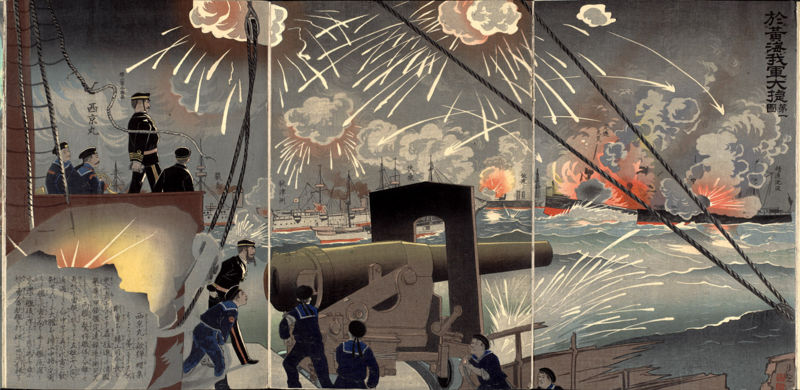Pre-1904
Until March 31, 1854, Japan was largely a closed nation. Although contact and
occasional conflict with nearby nations occurred, as well as minor European
contact starting in the 16th century, Japan remained a closed country with a
firm isolationist attitude. She developed a rich culture with little outside
influence. But on that day in 1854, a an American fleet lead by
Commodore Mathew Peary forced the Japanese to open their borders and trade
with the world. Soon after, many other European countries forced
similar
agreements upon Japan. These actions by imperial nations against what they
viewed to be a backward 'primitive' country would ironically be the spark for
Japanese imperialism. For many years, there was great turmoil and change
in Japan. Skirmishes with well-armed Western armed forces resulted in the deaths
and Japanese willing to try. Assassinations, famines, rebellions, and power
struggles were common. At last in 1867 a new Emperor arose:
Emperor Meiji. After his
armies defeated anti-westerner forces in the Boshin War, which occurred in
1868-1869, the Meiji Restoration began. The Meiji Restoration was partly the
restoral of Japan to Imperial rule, from a feudal city-state system. But it was
must importantly the combining of Western Technology and Information with
Eastern Values and Worldviews. In this Imperial system, the Emperor is a
figurehead with little authority. The country was actually ruled by a collection
of the politically elite, who eventually unified the country with land seizures,
taxes, and the reduction of social barriers. The orders of the Government were
carried out by a conscript army, an idea learned from the west, commanded by
officers taken from the Tokyo police force. Although the samurai were forced to
join society, the concept of the Samurai honor and fighting spirit contributed
greatly to Japanese Nationalism. The Industrialization and Modernization of
Japan would require more resources and labour than was available at home. This
began to Japanese Imperialism.
borders and trade
with the world. Soon after, many other European countries forced
similar
agreements upon Japan. These actions by imperial nations against what they
viewed to be a backward 'primitive' country would ironically be the spark for
Japanese imperialism. For many years, there was great turmoil and change
in Japan. Skirmishes with well-armed Western armed forces resulted in the deaths
and Japanese willing to try. Assassinations, famines, rebellions, and power
struggles were common. At last in 1867 a new Emperor arose:
Emperor Meiji. After his
armies defeated anti-westerner forces in the Boshin War, which occurred in
1868-1869, the Meiji Restoration began. The Meiji Restoration was partly the
restoral of Japan to Imperial rule, from a feudal city-state system. But it was
must importantly the combining of Western Technology and Information with
Eastern Values and Worldviews. In this Imperial system, the Emperor is a
figurehead with little authority. The country was actually ruled by a collection
of the politically elite, who eventually unified the country with land seizures,
taxes, and the reduction of social barriers. The orders of the Government were
carried out by a conscript army, an idea learned from the west, commanded by
officers taken from the Tokyo police force. Although the samurai were forced to
join society, the concept of the Samurai honor and fighting spirit contributed
greatly to Japanese Nationalism. The Industrialization and Modernization of
Japan would require more resources and labour than was available at home. This
began to Japanese Imperialism.
The First Sino-Japanese War

Between August 1, 1894 and April 17, 1895, Japan fought a war against China over
control of Korea. With her European weapons and tactics, she easily defeated the
Chinese forces in Korea by cutting off their supply routes and crushing their
forces. While Japan gained much in the way of land and monetary reparations, she
was becoming almost a puppet of European nations. European countries such as
Germany, The British Empire and Russia believed Japan to be a useful regional
Ally who could be manipulated to do their bidding, yet not in any way be a
threat to them. But times were changing. Japan was quickly becoming a player on
the International scene, a country that did not want to be a puppet, a country
ready to prove herself...
And the Opportunity was about to come...

 Main Page
Main Page

 borders and trade
with the world. Soon after, many other European countries forced
similar
agreements upon Japan. These actions by imperial nations against what they
viewed to be a backward 'primitive' country would ironically be the spark for
Japanese imperialism. For many years, there was great turmoil and change
in Japan. Skirmishes with well-armed Western armed forces resulted in the deaths
and Japanese willing to try. Assassinations, famines, rebellions, and power
struggles were common. At last in 1867 a new Emperor arose:
Emperor Meiji. After his
armies defeated anti-westerner forces in the Boshin War, which occurred in
1868-1869, the Meiji Restoration began. The Meiji Restoration was partly the
restoral of Japan to Imperial rule, from a feudal city-state system. But it was
must importantly the combining of Western Technology and Information with
Eastern Values and Worldviews. In this Imperial system, the Emperor is a
figurehead with little authority. The country was actually ruled by a collection
of the politically elite, who eventually unified the country with land seizures,
taxes, and the reduction of social barriers. The orders of the Government were
carried out by a conscript army, an idea learned from the west, commanded by
officers taken from the Tokyo police force. Although the samurai were forced to
join society, the concept of the Samurai honor and fighting spirit contributed
greatly to Japanese Nationalism. The Industrialization and Modernization of
Japan would require more resources and labour than was available at home. This
began to Japanese Imperialism.
borders and trade
with the world. Soon after, many other European countries forced
similar
agreements upon Japan. These actions by imperial nations against what they
viewed to be a backward 'primitive' country would ironically be the spark for
Japanese imperialism. For many years, there was great turmoil and change
in Japan. Skirmishes with well-armed Western armed forces resulted in the deaths
and Japanese willing to try. Assassinations, famines, rebellions, and power
struggles were common. At last in 1867 a new Emperor arose:
Emperor Meiji. After his
armies defeated anti-westerner forces in the Boshin War, which occurred in
1868-1869, the Meiji Restoration began. The Meiji Restoration was partly the
restoral of Japan to Imperial rule, from a feudal city-state system. But it was
must importantly the combining of Western Technology and Information with
Eastern Values and Worldviews. In this Imperial system, the Emperor is a
figurehead with little authority. The country was actually ruled by a collection
of the politically elite, who eventually unified the country with land seizures,
taxes, and the reduction of social barriers. The orders of the Government were
carried out by a conscript army, an idea learned from the west, commanded by
officers taken from the Tokyo police force. Although the samurai were forced to
join society, the concept of the Samurai honor and fighting spirit contributed
greatly to Japanese Nationalism. The Industrialization and Modernization of
Japan would require more resources and labour than was available at home. This
began to Japanese Imperialism.